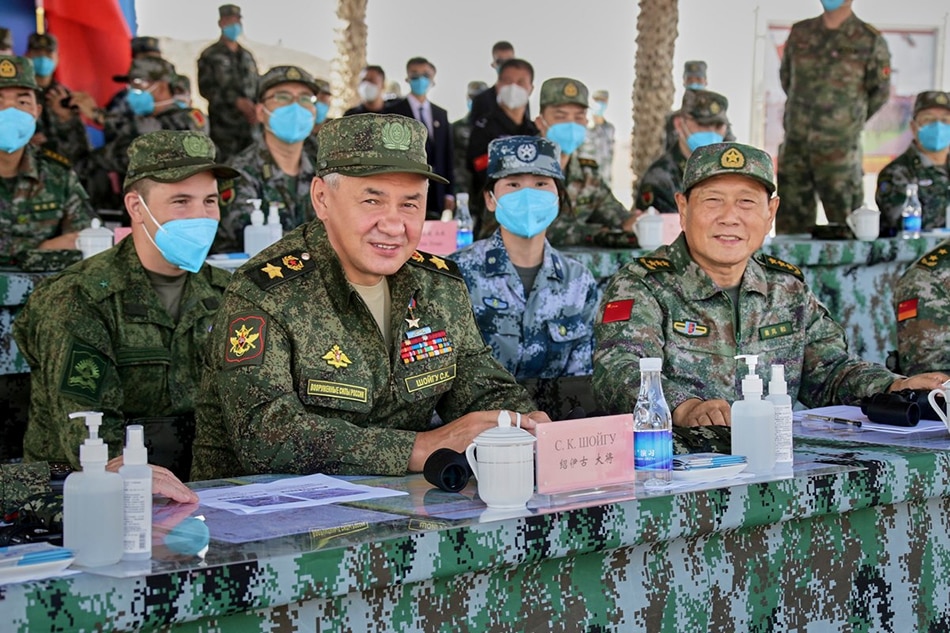- Joined
- Mar 24, 2009
- Messages
- 4,988
- Likes
- 9,931
Defense chiefs agree to expand cooperation through strategic exercises and joint patrols in the Asia-Pacific, says Russian ministry

China and Russia are edging closer to a de facto military alliance to counter growing pressure from the United States, with the Russian defence chief telling his Chinese counterpart that US aircraft activity near the country’s borders had increased.
In a video call on Tuesday, Russian Defence Minister Sergei Shoigu and Chinese Defence Minister General Wei Fenghe agreed to expand cooperation through strategic exercises and joint patrols in the Asia-Pacific, including the Sea of Japan and the East China Sea, according to Russia’s defence ministry.
Shoigu said there had been a “significant intensification” in activities by US strategic bombers near Russia’s borders. “Over the past month, about 30 sorties have been made to the borders of the Russian Federation, which is 2.5 times more than in the corresponding period last year,” he said.
That included this month’s Global Thunder exercise, which Shoigu claimed involved 10 US strategic bombers in a scenario of using nuclear weapons against Russia from the west and east, and that they came within 20km (12 miles) of the Russian border.
Shoigu noted that US air patrols near Russia’s eastern borders had increased, with a total of 22 strategic flights over the Sea of Okhotsk in 2020 – up from three the previous year – which he said posed a threat to both Russia and China.
“Against this background, Russian-Chinese coordination is becoming a stabilising factor in world affairs,” Shoigu said.
Chinese Defence Minister Wei told Shoigu that Russia had “successfully countered” the pressure and military threats from the US, according to Russian news agency Tass.
China had also “completely withstood the US pressure and deterrence”, Wei was quoted as saying.
In a brief statement, China’s defence ministry said the two sides would “continue to deepen strategic cooperation between the two militaries, continue to strengthen cooperation in strategic exercises, joint patrols and other areas, and continue to make new contributions to safeguarding the core interests of China and Russia and maintaining international and regional security and stability”.
The defence chiefs discussed joint naval patrols in the northwest Pacific and joint air patrols over the Sea of Japan and East China Sea during the call, and signed a road map for closer military cooperation over the next five years, Russia’s defence ministry said, without giving further details.
The talks came as China and Russia are steadily moving to deepen their military ties as part of efforts to counter pressure from the West.
Earlier on Tuesday, the People’s Liberation Army accused the US of “creating safety risks and jeopardising regional stability” after the USS Milius guided-missile destroyer sailed through the Taiwan Strait. The US Seventh Fleet called it a “routine” transit to “demonstrate the US commitment to a free and open Indo-Pacific”.
Meanwhile, tensions are mounting between Moscow and Washington after US intelligence officials warned European allies that Russia had deployed about 100,000 troops as well as artillery on its border with Ukraine and was weighing military measures in Ukraine, an allegation the Kremlin said was inflammatory.
Last month, five Chinese and five Russian warships made the first joint passage through the Tsugaru Strait in the Japanese archipelago after wrapping up their annual exercises near the Peter the Great Gulf in the Sea of Japan.
And on Friday, Chinese and Russian air forces held their third joint air patrol, with both sending two bombers over the Sea of Japan and the East China Sea. South Korea scrambled fighters in response, while Japan lodged a protest with Beijing and Moscow.
Song Zhongping, a Hong Kong-based military commentator, expected to see more such exercises between the two militaries in the Asia-Pacific – including the Sea of Japan and the East and South China seas. “China and Russia may also increase joint strategic cooperation, including on anti-missile and early-warning systems, as well as between different military services,” he said.

 news.abs-cbn.com
news.abs-cbn.com
China and Russia are edging closer to a de facto military alliance to counter growing pressure from the United States, with the Russian defence chief telling his Chinese counterpart that US aircraft activity near the country’s borders had increased.
In a video call on Tuesday, Russian Defence Minister Sergei Shoigu and Chinese Defence Minister General Wei Fenghe agreed to expand cooperation through strategic exercises and joint patrols in the Asia-Pacific, including the Sea of Japan and the East China Sea, according to Russia’s defence ministry.
Shoigu said there had been a “significant intensification” in activities by US strategic bombers near Russia’s borders. “Over the past month, about 30 sorties have been made to the borders of the Russian Federation, which is 2.5 times more than in the corresponding period last year,” he said.
That included this month’s Global Thunder exercise, which Shoigu claimed involved 10 US strategic bombers in a scenario of using nuclear weapons against Russia from the west and east, and that they came within 20km (12 miles) of the Russian border.
Shoigu noted that US air patrols near Russia’s eastern borders had increased, with a total of 22 strategic flights over the Sea of Okhotsk in 2020 – up from three the previous year – which he said posed a threat to both Russia and China.
“Against this background, Russian-Chinese coordination is becoming a stabilising factor in world affairs,” Shoigu said.
Chinese Defence Minister Wei told Shoigu that Russia had “successfully countered” the pressure and military threats from the US, according to Russian news agency Tass.
China had also “completely withstood the US pressure and deterrence”, Wei was quoted as saying.
In a brief statement, China’s defence ministry said the two sides would “continue to deepen strategic cooperation between the two militaries, continue to strengthen cooperation in strategic exercises, joint patrols and other areas, and continue to make new contributions to safeguarding the core interests of China and Russia and maintaining international and regional security and stability”.
The defence chiefs discussed joint naval patrols in the northwest Pacific and joint air patrols over the Sea of Japan and East China Sea during the call, and signed a road map for closer military cooperation over the next five years, Russia’s defence ministry said, without giving further details.
The talks came as China and Russia are steadily moving to deepen their military ties as part of efforts to counter pressure from the West.
Earlier on Tuesday, the People’s Liberation Army accused the US of “creating safety risks and jeopardising regional stability” after the USS Milius guided-missile destroyer sailed through the Taiwan Strait. The US Seventh Fleet called it a “routine” transit to “demonstrate the US commitment to a free and open Indo-Pacific”.
Meanwhile, tensions are mounting between Moscow and Washington after US intelligence officials warned European allies that Russia had deployed about 100,000 troops as well as artillery on its border with Ukraine and was weighing military measures in Ukraine, an allegation the Kremlin said was inflammatory.
Last month, five Chinese and five Russian warships made the first joint passage through the Tsugaru Strait in the Japanese archipelago after wrapping up their annual exercises near the Peter the Great Gulf in the Sea of Japan.
And on Friday, Chinese and Russian air forces held their third joint air patrol, with both sending two bombers over the Sea of Japan and the East China Sea. South Korea scrambled fighters in response, while Japan lodged a protest with Beijing and Moscow.
Song Zhongping, a Hong Kong-based military commentator, expected to see more such exercises between the two militaries in the Asia-Pacific – including the Sea of Japan and the East and South China seas. “China and Russia may also increase joint strategic cooperation, including on anti-missile and early-warning systems, as well as between different military services,” he said.

China, Russia move closer to de facto military alliance
China and Russia are edging closer to a de facto military alliance to counter growing pressure from the United States.
